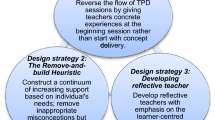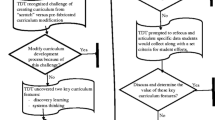Abstract
Many innovative teaching approaches lack classroom impact because teachers consider the proposals impractical. Making a teaching approach practical requires instrumentality (procedures), congruence (local fit), and affordable cost (limited time and resources).This paper concerns a study on the development and effects of a participatory design based teacher training trajectory aimed at making guided discovery learning (GDL) practical for student biology teachers. First, we identified practical heuristics for designing GDL lessons by analyzing design protocols made by biology teachers who are experts in GDL. Next we inventoried student responses to their regular lessons and to GDL based lessons. Based on this we prepared a teacher training program for eleven student biology teachers in which they applied the heuristics and stepwise extended their teaching repertoire in the direction of GDL. The participants’ design processes and resulting lesson plans were scored on both use of design heuristics and GDL characteristics. The participants were interviewed about their motivational beliefs before and after the program. Results showed that student teachers are able to design GDL lessons and used the heuristics to design GDL lessons. Their motivation for implementing GDL in their classroom had increased substantially. The paper concludes with a critical reflection on our method of participatory design and its applicability.
Similar content being viewed by others
References
Ajzen, I., & Fishbein, M. (2008). Scaling and testing multiplicative combinations in the expectancy-value model. Journal of Applied Social Psychology, 38, 2222–2247.
Bandura, A. (1997). Self-efficacy: The exercise of control. New York: Freeman.
Borko, H., Jacobs, J., & Koellner, K. (2010). Contemporary approaches to teacher professional development. In P. Peterson, E. Baker, & B. McGaw (Eds.), International Encyclopedia of Education (vol 7, pp. 548–556). Oxford: Elsevier.
Borko, H., & Putnam, R. (1996). Learning to teach. In D. Berliner & R. Calfee (Eds.), Handbook of educational psychology (pp. 673–708). New York: Macmillan.
Brown, A. L., & Campione, J. C. (1994). Guided discovery in a community of learners. In K. McGilly (Ed.), Classroom lessons: Integrating theory and practice (pp. 201–228). Cambridge, MA: MIT Press.
Bruner, J. S. (1961). The act of discovery. Harvard Educational Review, 31, 21–32.
Chin, C. (2007). Teacher questioning in science classrooms: Approaches that stimulate productive thinking. Journal of Research in Science Teaching, 44, 815–843. doi:10.1002/tea.20171.
Dam, M., Janssen, F. J. J. M., & van Driel, J. H. (2013). Concept-contextonderwijs leren ontwerpen en uitvoeren—een onderwijsvernieuwing praktisch bruikbaar maken voor docenten [How to make concept-context education practical for biology teachers]. Pedagogische Studiën, 90(2), 63–77.
Davis, E. A., Petis, D., & Smithey, J. (2006). Challenges new science teachers face. Research of Educational Research, 76, 607–651. doi:10.3102/00346543076004607.
Dennett, D. C. (1995). Darwin’s dangerous idea?. New York: Simon Schuster.
Doyle, W., & Ponder, G. (1977). The ethic of practicality and teacher decision-making. Interchange, 8, 1–12.
Fishbein, M., & Ajzen, I. (2010). Predicting and changing behavior. The reasoned action approach. New York: Psychology Press.
Gage, N. L. (2009). A conception of teaching. Dordrecht: Springer.
Gigerenzer, G. (2004). Striking a blow for sanity in theories of rationality. In M. Augier & J. G. March (Eds.), Models of a man: Essays in memory of Herbert A. Simon (pp. 389–409). Cambridge, MA: MIT Press.
Gigerenzer, G., & Gaissmaier, W. (2011). Heuristic decision making. Annual Review of Psychology, 62, 451–482. doi:10.1146/annurev-psych-120709-145346.
Hmelo-Silver, C., Duncan, R., & Chinn, C. (2007). Scaffolding and achievement in problem-based and inquiry learning: a response to Kirschner, Sweller, and Clark. Educational Psychologist, 42, 99–107. doi:10.1080/00461520701263368.
Janssen, F. J. J. M. (1999). Ontwerpend leren in het biologieonderwijs. Uitgewerkt en beproefd voor immunologie [Learning by designing in biology education: Exemplified and tested for immunology]. Academisch proefschrift. Utrecht: CD-ß-press.
Janssen, F. J. J. M., de Hullu, A. E., & Tigelaar, D. H. (2008). Positive experiences as input for reflection by student teachers. Teachers and Teaching: Theory and Practice, 14, 115–127. doi:10.1080/13540600801965903.
Janssen, F. J. J. M., & Waarlo, A. J. (2010). Learning biology by designing. Journal of Biological Education, 44(2), 87–96. doi:10(1080/00219266).2010.9656199.
Janssen, F. J. J. M., Westbroek, H. B., Doyle, W., & van Driel, J. H. (2013). How to make innovations practical. Teachers College Record, 115(7), 1–43.
Janssen, F. J. J. M., Westbroek, H. B. & Doyle, W. (accepted). The practical turn in teacher education. Designing core practice training sequences. Journal of Teacher Education.
Kennedy, M. M. (2010). Attribution error and the quest for teacher quality. Educational Researcher, 39, 591–598. doi:10.3102/0013189X10390804.
Keys, C., & Bryan, L. A. (2001). Co-constructing inquiry-based science with teachers: Essential research for lasting reform. Journal of Research in Science Education, 38, 641–654. doi:10.1002/tea.1023.
Kirschner, A., Sweller, J., & Clark, R. (2006). Why minimal guidance during instruction does not work: An analysis of the failure of constructivist, discovery, problem-based, experiential, and inquiry based teaching. Educational Psychologist, 41, 75–86. doi:10.1207/s15326985ep4102_1.
Könings, K. D., Brand-Gruwel, S., & van Merriënboer, J. J. G. (2005). Towards more powerful learning environments through combining the perspectives of designers, teachers and students. British Journal of Educational Psychology, 75, 645–660. doi:10.1348/000709905X43616.
Könings, K. D., Brand-Gruwel, S., & van Merriënboer, J. J. G. (2011). Participatory Instructional redesign by students and teachers in secondary education: Effects on perceptions of instruction. Instructional Science, 39, 737–762. doi:10.1080/00131881003588204.
Lewens, T. (2009). Seven types of adaptationism. Biology and Philosophy, 24, 161–182. doi:10.1007/s10539-008-9145-7.
Lijnse, P. L., & Klaassen, C. W. J. M. (2004). Didactical structures as an outcome of research on teaching-learning sequences? International Journal of Science Education, 26, 537–554. doi:10.1080/09500690310001614753.
Macalalag, A.Z. & Duncan, R.G. (2010). Changes in teachers’ ability to design inquiry-based lessons. In Proceedings of the 9th International Conference of the Learning Sciences (vol. 1), Chicago, IL, (pp. 199–209).
Mayer, R. E. (2004). Should there be a three-strikes rule against pure discovery learning? The case for guided methods of instruction. American Psychologist, 59, 14–19. doi:10.1037/0003-066X.59.1.14.
Pollock, J. L. (2006). Thinking about acting. Logical foundations for rational decision making. Oxford: Oxford University Press.
Reiser, B. J. (2004). Scaffolding complex learning: The mechanisms of structuring and problematizing student work. Journal of the Learning Sciences, 13, 273–304. doi:10.1207/s15327809jls1303_2.
Seidel, T., & Shavelson, R. (2007). Teaching effectiveness research in the past decade: The role of theory and research design in disentangling meta-analysis results. Review of Educational Research, 77(4), 454–500. doi:10.3102/0034654307310317.
Shulman, L. S., & Quinlan, K. M. (1996). The comparative psychology of school subjects. In D. C. Berliner & R. C. Calfee (Eds.), Handbook of educational psychology (pp. 399–422). New York: Simon & Schuster Macmillan.
Simonson, J., & Robertson, T. (2012). Routledge international handbook of participatory design. New York: Routledge.
Spillane, J., Reiser, B., & Reimer, T. (2002). Policy implementation and cognition: Reframing and refocusing implementation research. Review of Educational Research, 72, 387–431. doi:10.3102/00346543072003387.
Wouters, A. G. (2007). Design explanations: Determining the constraints on what can be alive. Erkenntnis, 67, 65–80. doi:10.1007/s10670-007-9045-2.
Author information
Authors and Affiliations
Corresponding author
Rights and permissions
About this article
Cite this article
Janssen, F.J.J.M., Westbroek, H.B. & van Driel, J.H. How to make guided discovery learning practical for student teachers. Instr Sci 42, 67–90 (2014). https://doi.org/10.1007/s11251-013-9296-z
Received:
Accepted:
Published:
Issue Date:
DOI: https://doi.org/10.1007/s11251-013-9296-z




